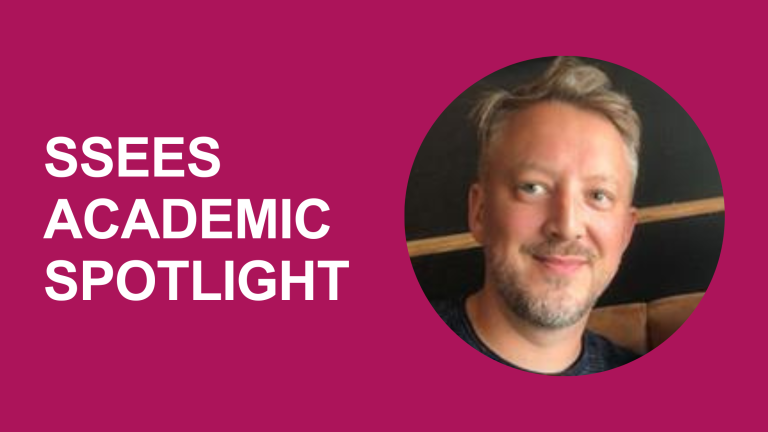Academic Spotlight: Dr Christian Emery
26 January 2024
In this edition of the SSEES Academic Spotlight, we hear from Dr Christian Emery, Departmental Tutor & Associate Professor (Teaching) in International Relations at UCL SSEES.

What brought to you work at SSEES?
I completed my PhD in my hometown of Birmingham and then taught at LSE for three years before taking up a permanent lectureship at Plymouth. I applied for the job at SSEES because it seemed a unique opportunity to play a leading role in improving the student experience, which I’m passionate about, whilst allowing me to continue to work as a scholar and teacher at a world-leading institution like SSEES. My academic background is a bit different to most of my SSEES colleagues, having mostly taught in International Relations departments and mostly worked on the Middle East and US Foreign Policy, but I had taught Russian foreign policy at LSE with Roy Allison and written about Iranian-Russian relations and Soviet policy in the Middle East. So, I felt I could contribute to SSEES’s core politics and IR teaching whilst offering students the chance to study the Middle East using their SSEES knowledge.
If you weren’t working in academia, what would be your dream job?
If you’d asked me 25 years ago, I’d have said professional cricketer or lead guitarist in Weezer. Now, I’d say being a food critic seems a pretty sweet gig. But Weezer are still touring so my offer to them still stands (if they solemnly promise to only play songs from their first 3 albums).
Can you tell us a bit about your research/teaching and why it’s important to study this?
I teach Russian foreign policy and Middle Eastern politics in an undeniably grim era. But I remind my students that SSEES was established, in 1915, amidst the carnage of WW1. Shortly after the armistice, in 1919, the academic discipline of International Relations was established to better understand why states go to war - in the hope that the more systematic production of this knowledge would help to build a more peaceful international system. I think it's fair to say that the proceeding 105 years has not seen sufficient progress, yet we cannot discharge ourselves of the obligation. I suppose the sad paradox our SSEES community faces is that there has never been a more important time to talk about Russian foreign policy, yet there has perhaps also never been a more emotionally difficult moment to do so. Some of my work on the regional impact of the Iranian revolution, and the origins of the US-Iranian confrontation, would also seem pretty relevant.
Outside of work, how do you unwind?
Well, I have three lovely children aged 2, 5, and 7 who are always keen to distract me from my work. But that inevitably produces a need for even more unwinding so for that I’m obsessed with cooking. I’ve been playing the guitar since I was 10. I play in a band full of other middle-aged academics and sometimes at a local jam session that by happy coincidence occurs in my local pub. I used to do a lot of sport to relax, but now I just stick to cycling (although I still resist the indignity of Lycra).
If you could recommend only one book, what would it be?
I could not. But if like me you have little time to read fiction but love American novels, I commend to you Cannery Row by John Steinbeck. Not necessarily a recommendation, but I read E.H Carr’s Twenty Years’ Crisis as a History undergraduate student and it had a major influence in me wanting to study international relations.
Who has been the greatest source of inspiration to you, and how have they impacted you, personally or professionally?
It’s aggressively corny but the honest answer is the person I’ve lived with for the last 20 years. But my parents were both academics, so they’ve probably had a pretty big impact on my career choice (although I forgive them for it).
Tell us something about you that might surprise people.
I’ll tell you something that recently surprised me. I only discovered last year that there’s a portrait of my great-great uncle, William Basil Emery, in the National Portrait Gallery. He was an army officer and fought in WW1 against the Bulgarians in Salonika and the Ottoman Empire in Palestine. He was then stationed in Constantinople (soon to be officially renamed as Istanbul) during the Turkish War of Independence. So, he had a front seat for the collapse of the Ottoman Empire, the establishment of the Turkish state, and the subsequent redrawing of the borders of the Middle East (and parts of the Balkans). I can’t imagine we’d share the same analysis of British colonialism, but I’d have loved to have met him!
 Close
Close

